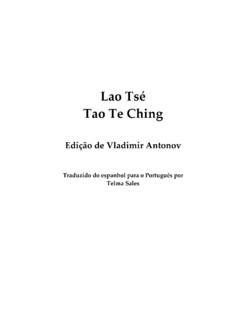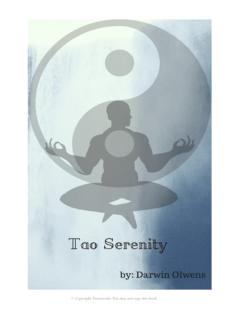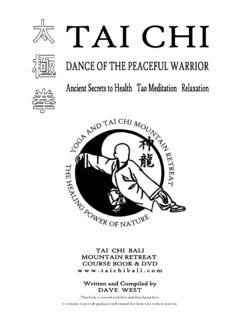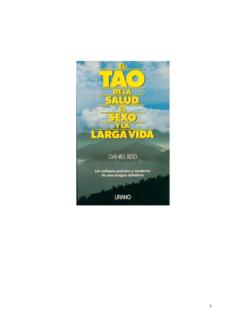Transcription of Tao Te Ching
1 Tao Te Ching Chapter One Tao (The Way) that can be spoken of is not the Constant Tao The name that can be named is not a Constant Name. Nameless, is the origin of Heaven and Earth; The named is the Mother of all things. Thus, the constant void enables one to observe the true essence. The constant being enables one to see the outward manifestations. These two come paired from the same origin. But when the essence is manifested, It has a different name. This same origin is called The Profound Mystery. As profound the mystery as It can be, It is the Gate to the essence of all life. Chapter Two As soon as beauty is known by the world as beautiful, it becomes ugly.
2 As soon as virtue is being known as something good, it becomes evil. Therefore being and non-being give birth to each other. Difficult and easy accomplish each other. Long and short form each other. High and low distinguish each other. Sound and tone harmonize each other Before and after follow each other as a sequence. Realizing this, the saint performs effortlessly according to the natural Way without personal desire, and practices the wordless teaching thru one s deeds. The saint inspires the vitality of all lives, without holding back. He nurtures all beings with no wish to take possession of. He devotes all his energy but has no intention to hold on to the merit.
3 When success is achieved, he seeks no recognition. Because he does not claim for the credit, hence shall not lose it. Chapter Three By not adoring the worthy, people will not fall into dispute. By not valuing the hard to get objects, people will not become robbers. By not seeing the desires of lust, one s heart will not be confused. Therefore the governing of the saint is to empty one s mind, substantiate one s virtue, weaken one s worldly ambition and strengthen one s essence. He lets the people to be innocent of worldly knowledge and desire, and keeps the clever ones from making trouble with their wits. Acts naturally without desire, then everything will be accomplished in its natural order.
4 Chapter Four Tao (The Way) can be infused into the nature and put to use without being exhausted. It is so deep and subtle like an abyss that is the origin of all things. It is complete and perfect as a wholeness that can Round off sharp edges; Resolve confusion; Harmonize with the glory; Act in unity with the lowliness. Tao is so profound and yet in invisible, It exists in everywhere and anywhere. I don not know whose Son It is, It existed before heaven and earth. Chapter Five Nature nurtures all things with the wholeness of complete virtue. It shows the greatest and perfect kindness by giving life to let all things grow and accomplish them with the hastening of harvest.
5 Therefore, according to ancient custom, nature may seem unkind to regard all beings as a traditional straw dog for sacrifice. And likewise with a saint, he may seem unkind to regard people as a traditional straw dog for sacrifice. The space between heaven and earth is like the bellows, it appears empty yet it gives a supply that never fails; The more it moves, the more it brings forth. Many words lead to exhaustion. It is better to center on the true essence within. Chapter Six Spirit of the valley is immortal. It is called the mystic nature. The gate o f the mystic nature is regarded as the root of the universe. It is everlasting and cannot be consumed. Chapter Seven Heaven is everlasting and earth is enduring.
6 The reason that they are everlasting is because they do not exist for themselves. Hence, they are long lived. Thus, although the saint puts himself last, finds himself in the lead. Although he is not self-concerned, finds himself accomplished. It is because he is not focused on self-interests and hence can fulfill his true nature. Chapter Eight A person of great virtue is like the flowing water. Water benefits all things and contends not with them. It puts itself in a place that no one wishes to be and thus is closest to Tao. A virtuous person is like water which adapts itself to the perfect place. His mind is like the deep water that is calm and peaceful.
7 His heart is kind like water that benefits all. His words are sincere like the constant flow of water. His governing is natural without desire which is like the softness of water that penetrates through hard rocks. His work is of talent like the free flow of water. His movement is of right timing like water that flows smoothly. A virtuous person never forces his way and hence will not make faults. Chapter Nine Those who overly pride wealth is like the overflowing water which shall cause damages. It is better to restrain early. Those who are not content with fame is like polishing the edge of a knife. The sharper it gets, the easier it is to break. Wealth and treasures are but illusions that one cannot possess.
8 Those who are arrogant of their wealth and fame shall invite blame upon oneself. The nature Tao teaches one to retreat after one s success and not to hold on to the credit. Chapter Ten Can one unite the body and the spirit as one and embrace the Oneness without departing from the great Tao? Can one achieve harmony with such gentleness by holding on to the true spirit within as if the innocence of an infant? Can one free oneself from worldly knowledge and cleanse one s mind, so that no faults shall be made? Can a ruler love his people by governing with the natural Way without personal intention? Can the mystic gate to all life essence be opened or closed without the virtue of the mysterious nature?
9 Can one gain the insight of nature and become a wise person without the effort of action? The mysterious nature creates and nurtures all things without the desire to possess them. It performs with all efforts without claiming for credit. It flourishes all beings without the intention to take control of. Such is the Mystic Te or Mystic Virtue. Chapter Eleven Thirty spokes unite around one hub to make a wheel. It is the presence of the empty space that gives the function of a vehicle. Clay is molded into a vessel. It is the empty space that gives the function of a vessel. Doors and windows are chisel out to make a room. It is the empty space in the room that gives its function.
10 Therefore, something substantial can be beneficial. While the emptiness of void is what can be utilized. Chapter Twelve The five colors can blind one s eyes. The five tones can deafen one s ears. The five flavors can dull one s taste buds. The pursuit of pleasures can derange one s mind. The hard-to-get valuables can distort one s behavior. Therefore, a saint cultivates himself with virtues and does not indulge himself in sensory pleasures. He rejects those outer temptations and chooses this True Nature. Chapter Thirteen Honor and disgrace can surprise a person. The greatest distress lies in one s physical body. What does it men by Honor and disgrace can surprise someone?










